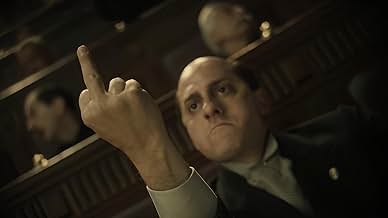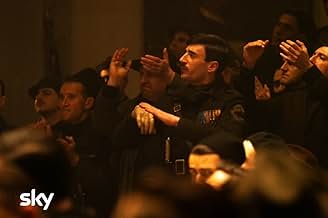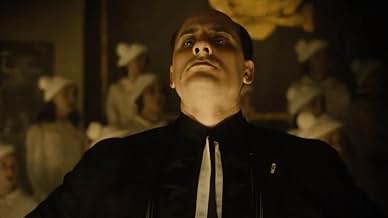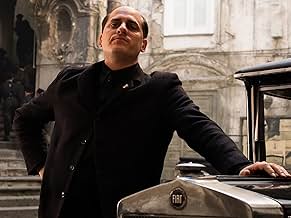Narra a ascensão ao poder do ditador italiano Benito Mussolini em uma história de um país que se rendeu à ditadura.Narra a ascensão ao poder do ditador italiano Benito Mussolini em uma história de um país que se rendeu à ditadura.Narra a ascensão ao poder do ditador italiano Benito Mussolini em uma história de um país que se rendeu à ditadura.
- Prêmios
- 2 vitórias no total
Explorar episódios
Avaliações em destaque
By now it is evident that in the Post-network era and when from the zenith the third Golden Age of Television began its inevitable downward parabola no one, including myself, would have expected such a product... especially an Italian one.
M the son of the century is the classic turn of the century, the breaktrough event or, if you like a film allegory better: it is the hero we need but do not deserve. The future of Our television, it is clear, blatant and unashamed that it will be defined by the 'Before M' and the 'After M'.
Beautiful, beautiful series. Monumental every performance. Ficcanti every dialogue. Generative storytelling from history and brought up to date, without ever becoming exhibitionist. A series one step away from hybris without ever crossing the thin line and, because of this, incredibly verisimilitude in its (deliberate) staging between the theatrical and magical realism.
A possible event, because there is a thick book behind it, not only of volume but also of historical research... but also (oh my God, finally!!!) an adequate budget. It matters little that some images are realistically dated in the staging. It doesn't matter. You want the real date? There's the book but in this instalment it was perfectly there.
A futurist Zang Tumb Tumb series like we've needed for a long time. Because, just like futurism, the last true and pure current of thought and artistic movement that since the publication of its manifesto in 1909 has not found to date a worthy new cultural vision that can be described as truly original and not a rinsing of dishes from other shores. This is M. The first of something else in the making that, los peri pernos, will be even more surprising and innovative.
Zang Tumb Tumb.
M the son of the century is the classic turn of the century, the breaktrough event or, if you like a film allegory better: it is the hero we need but do not deserve. The future of Our television, it is clear, blatant and unashamed that it will be defined by the 'Before M' and the 'After M'.
Beautiful, beautiful series. Monumental every performance. Ficcanti every dialogue. Generative storytelling from history and brought up to date, without ever becoming exhibitionist. A series one step away from hybris without ever crossing the thin line and, because of this, incredibly verisimilitude in its (deliberate) staging between the theatrical and magical realism.
A possible event, because there is a thick book behind it, not only of volume but also of historical research... but also (oh my God, finally!!!) an adequate budget. It matters little that some images are realistically dated in the staging. It doesn't matter. You want the real date? There's the book but in this instalment it was perfectly there.
A futurist Zang Tumb Tumb series like we've needed for a long time. Because, just like futurism, the last true and pure current of thought and artistic movement that since the publication of its manifesto in 1909 has not found to date a worthy new cultural vision that can be described as truly original and not a rinsing of dishes from other shores. This is M. The first of something else in the making that, los peri pernos, will be even more surprising and innovative.
Zang Tumb Tumb.
The film presents the beginnings of Benito Musollini's political career. But to a greater extent it is a study of the creation of a dictatorship. And this is a universal and timeless phenomenon.
What is unusual is the form, which may put off some viewers. The main character often speaks directly to the audience, presents his thoughts and comments on the events taking place, sometimes these allusions are current, e.g. In episode four when he says the slogan MIGA (you will understand when you see it). It is a really great scene.
The film is also quite baroque, at times surreal.
The acting makes a great impression. Luca Marinelli (Musollini) behaves on screen like his prototype. If you know the history and have seen Mussolini's grotesque speeches, you can imagine that this required great skills. Other roles, although episodic, are also worth attention. For example, Benedetta Cimatti is great as the suppressed wife of the Duce.
Due to the specific form of the film, some viewers may be put off by it.
But it's a very good movie.
What is unusual is the form, which may put off some viewers. The main character often speaks directly to the audience, presents his thoughts and comments on the events taking place, sometimes these allusions are current, e.g. In episode four when he says the slogan MIGA (you will understand when you see it). It is a really great scene.
The film is also quite baroque, at times surreal.
The acting makes a great impression. Luca Marinelli (Musollini) behaves on screen like his prototype. If you know the history and have seen Mussolini's grotesque speeches, you can imagine that this required great skills. Other roles, although episodic, are also worth attention. For example, Benedetta Cimatti is great as the suppressed wife of the Duce.
Due to the specific form of the film, some viewers may be put off by it.
But it's a very good movie.
A solid recommendation from me. I really enjoyed the flow, acting, action, and storytelling. I always find it fascinating how such a destructive force can rise to power-what forces support it, oppose it, and which ones get swayed, and why. The quality of the series is excellent. For me, it belongs in the same league as Der Untergang and Unsere Mütter, unsere Väter.
What makes this series particularly compelling is its exploration of the political landscape in Italy at the time. The power struggles between the socialists, the monarchy, and other factions add layers of intrigue, showing how different forces either resisted or enabled the rise of authoritarianism. The shifting allegiances and moral dilemmas make for gripping storytelling.
On top of that, the action sequences are intense and well-executed. The battles, street clashes, and political confrontations feel raw and realistic, adding weight to the historical events. The choreography, cinematography, and pacing of these scenes keep the tension high, making it a visually and emotionally engaging experience.
What makes this series particularly compelling is its exploration of the political landscape in Italy at the time. The power struggles between the socialists, the monarchy, and other factions add layers of intrigue, showing how different forces either resisted or enabled the rise of authoritarianism. The shifting allegiances and moral dilemmas make for gripping storytelling.
On top of that, the action sequences are intense and well-executed. The battles, street clashes, and political confrontations feel raw and realistic, adding weight to the historical events. The choreography, cinematography, and pacing of these scenes keep the tension high, making it a visually and emotionally engaging experience.
Best Most Engrossing TV In Years.
I don't know how much of the Parliamentary madness is historically accurate, how much the birth of Fascism was accurate either, what I do know this series is giving me and anyone who takes the time to engage with the movement the phenomenon called Fascism build by a human being who cut out the representative instinct, the fundamental purpose of Legitimate Representation, the instruments that since the Athenian experiment was found to successfully create, control the masses. The tools to create a society.
Mussolini brought this idea into our world. The use of chaos into politics. That by changing your position, saying the insayable, thinking the unthinkable you can take control of millions of people.
Mussolini proposed to do the impossible and made people believe he had done it. He unbalanced his opponents. The whole body politic couldn't construct a coherent strategy to combat him.
Sensible, pragmatic policies are forgotten as those who think otherwise gasp for breath.
And Benito with his grasp of how the prolaterate thought. How he instructed them to believe "His Message". The truth was never considered. Benito was the 1st. All our modern demi gods use El Duce play book. No Hitler. No Franco. No Pinochet. No Pol Pot. No Saddam without Mussolini.
El Duce thought them all.
And we laugh at him. Maybe its us that are the fools.
Who'll be next to use his bag of tricks?
So now we have this magnificent expose of control by an English director an Italian writer and Rupert Murdochs Sky putting the money, the distribution, the lesson on how not to be a politician in front of us.
The "Making Of" might be a mini series for another day.
To think till now "Gomorrah" was the height of our appreciation for Italian modern story telling. And season 1 ends with Matteotti murder. What a rich vein of contemporary instruction lays before us.
By the way. This is Magnificent. A 10 all day long and double on Sunday.
I don't know how much of the Parliamentary madness is historically accurate, how much the birth of Fascism was accurate either, what I do know this series is giving me and anyone who takes the time to engage with the movement the phenomenon called Fascism build by a human being who cut out the representative instinct, the fundamental purpose of Legitimate Representation, the instruments that since the Athenian experiment was found to successfully create, control the masses. The tools to create a society.
Mussolini brought this idea into our world. The use of chaos into politics. That by changing your position, saying the insayable, thinking the unthinkable you can take control of millions of people.
Mussolini proposed to do the impossible and made people believe he had done it. He unbalanced his opponents. The whole body politic couldn't construct a coherent strategy to combat him.
Sensible, pragmatic policies are forgotten as those who think otherwise gasp for breath.
And Benito with his grasp of how the prolaterate thought. How he instructed them to believe "His Message". The truth was never considered. Benito was the 1st. All our modern demi gods use El Duce play book. No Hitler. No Franco. No Pinochet. No Pol Pot. No Saddam without Mussolini.
El Duce thought them all.
And we laugh at him. Maybe its us that are the fools.
Who'll be next to use his bag of tricks?
So now we have this magnificent expose of control by an English director an Italian writer and Rupert Murdochs Sky putting the money, the distribution, the lesson on how not to be a politician in front of us.
The "Making Of" might be a mini series for another day.
To think till now "Gomorrah" was the height of our appreciation for Italian modern story telling. And season 1 ends with Matteotti murder. What a rich vein of contemporary instruction lays before us.
By the way. This is Magnificent. A 10 all day long and double on Sunday.
I mainly focus on the film aspects. Without getting too deep into it, I try to gauge how much truth versus mystification is presented. I don't align with either the right or the left.
This series is one of the most beautiful I have seen in recent times. Mussolini's dialogue with the camera is pure gold. The way he conveys his thoughts, mocks the viewer, and shares his confessions keeps you glued to the screen and makes you feel involved in the story. Marinelli is fantastic! Those who criticize him likely do so for reasons unrelated to his performance. Francesco Russo is superb, and Barbara Chichiarelli is perfect!
This series is one of the most beautiful I have seen in recent times. Mussolini's dialogue with the camera is pure gold. The way he conveys his thoughts, mocks the viewer, and shares his confessions keeps you glued to the screen and makes you feel involved in the story. Marinelli is fantastic! Those who criticize him likely do so for reasons unrelated to his performance. Francesco Russo is superb, and Barbara Chichiarelli is perfect!
Você sabia?
- CuriosidadesWhen Joe Wright got on board as director, at first he meant to have the actors say their lines in English. Then he changed his mind and chose to shoot the series in Italian, for a higher immediacy.
Principais escolhas
Faça login para avaliar e ver a lista de recomendações personalizadas
- How many seasons does Mussolini: Son of the Century have?Fornecido pela Alexa
Detalhes
- Data de lançamento
- Países de origem
- Central de atendimento oficial
- Idioma
- Também conhecido como
- Mussolini: Son of the Century
- Locações de filme
- Empresas de produção
- Consulte mais créditos da empresa na IMDbPro
- Tempo de duração52 minutos
- Cor
Contribua para esta página
Sugerir uma alteração ou adicionar conteúdo ausente


![Assistir a Trailer Season 1 [OV]](https://m.media-amazon.com/images/M/MV5BYWM4MjYyMDktOWQwNy00NzNlLTg0OGUtZjk5Yzk0MjA2YmNlXkEyXkFqcGdeQXRyYW5zY29kZS13b3JrZmxvdw@@._V1_QL75_UX500_CR0)

























